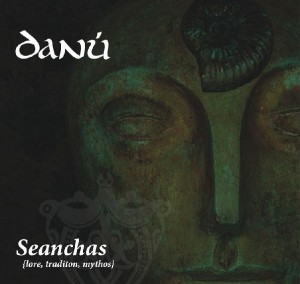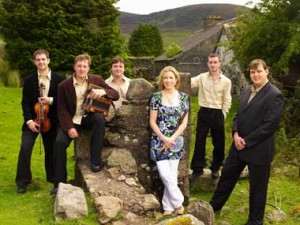 “When All is Said and Done,” the 2005 CD by the always thrilling Irish traditional group Danú, exploded out of the gate with a room-rocking set of reels. With the possible exception of lead singer Muireann Nic Amhlaoibh’s soulful rendition of “Cailin Deas ag Crúite na mBo,” the rest of the largely bright, uptempo recording followed suit.
“When All is Said and Done,” the 2005 CD by the always thrilling Irish traditional group Danú, exploded out of the gate with a room-rocking set of reels. With the possible exception of lead singer Muireann Nic Amhlaoibh’s soulful rendition of “Cailin Deas ag Crúite na mBo,” the rest of the largely bright, uptempo recording followed suit.
The new, self-produced “Seanchas” (pronounced: “shan-ahas”) shows a more reflective but no less passionate side of the band. There are some foot-stompers in the mix, to be sure—a breathtaking set of polkas on the second track (“Glenn Cottage,” “John Brosnan’s” and “Peata an Mhaoir”) springs to mind. There’s also a pretty set of jigs (“Snug in the Blanket” and “Patsy Geary’s”) at track 4, and a playful pairing of “Murphy’s Hornpipe” and “Lord Gordon’s Reel” at track 6. But “Seanchas” in the Irish language refers to folklore and mythos, and this Celtic concept album is seriously, and at times soberly, rooted in the historical and the traditional. Maybe it’s just more balanced than the last CD.
Consider Nic Amhlaoibh’s interpretation of two standards, “Mollai na gCuach Ni Chuilleanain” and “The Boys of Barr na Sráide,” both of them often recorded. In Nic Amhlaoibh’s capable and caring hands, both are presented with a kind of aching tenderness.
For those who have followed Danú since 1995, there is a special treat. Tenor Ciarán O Gealbháin, who was the band’s lead singer back in the day, joins Nic Amhlaoibh on “Cailín na nUrla Donn” (The Girl of the Brown Locks), a tune typically sung in a mishmosh of Irish and English. (The literal translation includes this gem, “Your waist and bones are nicely situated,” which has to be one of the worst pickup lines of all time.) It’s a sensitive, restrained performance that showcases both singers’ evident talents.
On the instrumental front, of course, Danú has lost nothing, even as some members seem to come and go. (And come back again.) A particular favorite is a pair of tunes, “Clancy’s Farewell to Whiskey” (written by guitarist Dónal Clancy) and the Breton piece, “An Dro des Petitis Bateaux.” Clancy, a founding member of the band, sets the tone for both pieces and turns in a delicate, enchanting performance. It’s the guitar-playing equivalent of diamond cutting. (By the way, the CD is dedicated to the memory of his father, the legendary Liam Clancy.)
As I say, things do liven up with some frequency, especially on the instrumentals. Box player Benny McCarthy is his usual rock-solid wondrous—especially on the aforementioned set of reels, and again on a later jig-reel combination, “Fiona’s Arrival” (written and also played beautifully by fiddler Oisín McAuley) into yet another standard, “O’Connell’s Trip to Parliament.” On bouzouki, Eamon Doorley provides solid backing throughout.
Besides O Gealbháin, other Danú-ites show up on several tracks, including Donnchadh Gough on bodhrán (but, sadly, not on uilleann pipes), and Tom Doorley on flute. Martin O’Neill contributes piano for “The Boys of Barr na Sráide.”
All told, a lovely and memorable piece of work—and perhaps their most musically mature outing to date.

